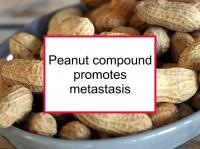While peanut consumption is associated with multiple potential health benefits, it is not recommended for breast cancer patients or survivors. Peanut intake is associated with lower levels of inflammatory markers, and is also associated with reduced risk of cardiovascular disease and type 2 diabetes.
Peanuts contain resveratrol, which has chemopreventive effects. However peanuts and peanut products, especially from non-U.S. sources, are frequently contaminated with molds that produce aflatoxins, which cause liver cancer and immuno-suppression in humans.
Peanuts contain peanut agglutinin (PNA), a lectin. Lectins are a type of protein that bind to certain sugar molecules (glycoproteins and glycolipids) on the surface of cells and tend to have potent biological activity. Peanut oil contains trace amounts of PNA. PNA is resistant to degradation by cooking and digestion and rapidly enters the bloodstream, while maintaining its bioactive potential.
Some lectins have been found to have anti-cancer effects and a few studies have reported that PNA inhibits proliferation of cultured cancer cells, including breast cancer. However, now a new study has reported that PNA promotes two important steps in the metastasis cascade and that peanut consumption increased metastasis in a mouse model of cancer.
Latest research finds peanut agglutinin promotes cancer metastasis
The study referenced at the beginning of this news story was designed to investigate whether PNA from common peanuts promotes cancer metastasis. PNA is known to bind to a sugar (oncofoetal Thomsen-Friedenreich (TF) disaccharide (galactoseβ1,3N-acetylgalactosamineα-)) that is overexpressed by approximately 90% of human cancers. The authors theorized that circulating PNA resulting from peanut consumption might mimic the actions of a compound that occurs naturally in humans and is known to promote metastasis (endogenous TF-binding human galectin-3).
PNA comprises approximately 0.15% of peanuts by weight. In the study, the authors demonstrated that PNA at blood concentrations similar to those found in humans after peanut consumption (1) increased cancer cell adhesion to the blood vascular endothelium; and (2) enhanced the formation of cancer cell homotypic aggregates, both of which are important steps in the metastasis cascade.
The authors also found that peanut consumption increased metastasis in a mouse model of cancer. Furthermore, these effects were demonstrated to result from PNA's interaction with the cancer-associated TF disaccharide on the transmembrane mucin protein MUC1: PNA caused MUC1 cell surface polarization, which in turn uncovered underlying cell surface adhesion molecules. The authors conclude that circulating PNA after peanut consumption mimics the actions of endogenous galectin-3 and promotes cancer cell metastatic spread. Since metastasis accounts for most of cancer-associated deaths, regular consumption of peanuts by cancer patients could have an adverse effect on cancer-specific survival, according to the authors.
Please see our article on peanuts for more information.
